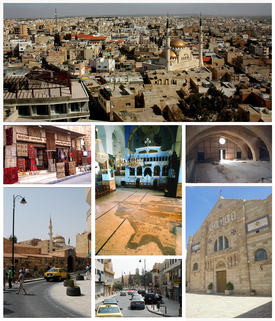Madeba
|
Madaba مدينة مادبا |
||
|---|---|---|
| City | ||

Madaba's skyline and King Hussein Mosque, Apostles Church, Shrine of the Beheading of Saint John the Baptist, St. George Church, Madaba Archaeological Park, Souvenir shops,Madaba Mosaic Map.
|
||
|
||
| Location in Jordan | ||
| Coordinates: 31°43′N 35°48′E / 31.717°N 35.800°E | ||
| Country |
|
|
| Governorate | Madaba Governorate | |
| Municipality established | 1921 | |
| Government | ||
| • Type | Municipality | |
| • Mayor | Mustafa Al-Ma'ay'ya | |
| Area | ||
| • City | 39.440 km2 (15.228 sq mi) | |
| • Metro | 100 km2 (40 sq mi) | |
| Elevation | 763 m (2,326 ft) | |
| Population (December 2011) | ||
| • City | 84,600 |
|
| Time zone | UTC+2 (UTC+2) | |
| • Summer (DST) | UTC+3 (UTC+3) | |
| Area code(s) | +(962)5 | |
| Website | https://web.archive.org/web/20100206191729/http://www.madabacity.gov.jo/ | |
Madaba (Arabic: مادبا; Biblical Hebrew: מֵידְבָא Meidvah) is the capital city of Madaba Governorate in central Jordan, with a population of about 60,000. It is best known for its Byzantine and Umayyad mosaics, especially a large Byzantine-era mosaic map of the Holy Land. Madaba is located 30 kilometres (19 miles) south-west of the capital Amman.
Madaba dates from the Middle Bronze Age.
The town of Madaba was once a Moabite border city, mentioned in the Bible in Numbers 21:30 and Joshua 13:9.
During its rule by the Roman and Byzantine empires from the 2nd to the 7th centuries, the city formed part of the Provincia Arabia set up by the Roman Emperor Trajan to replace the Nabataean kingdom of Petra.
The first evidence for a Christian community in the city, with its own bishop, is found in the Acts of the Council of Chalcedon in 451, where Constantine, Metropolitan Archbishop of Bostra (the provincial capital) signed on behalf of Gaiano, "Bishop of the Medabeni."
...
Wikipedia


